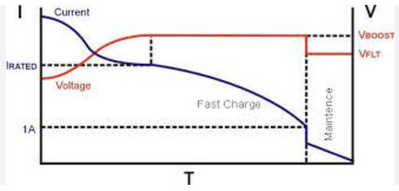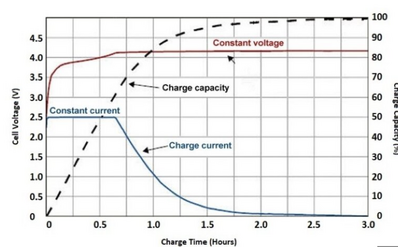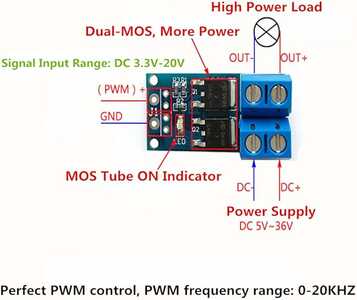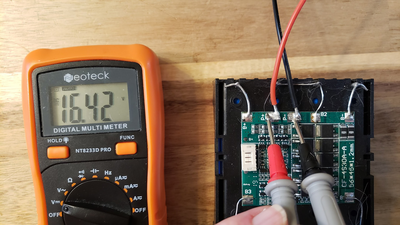Can any motor controller be used to charge a battery? Or do I need something designed just for charging batteries? I want to use an Arduino to vary the voltage being fed to the battery while monitoring the amperage.
Can any motor controller be used to charge a battery? Or do I need something designed just for charging batteries? I want to use an Arduino to vary the voltage being fed to the battery while monitoring the amperage.
Battery charging is a science. Yiu need Constant Voltage at some points in the curve, and Constant Current in others. I have attached the charge curves for both Lead Acid and Lithium. Hope this helps.
If it's Litium you are looking for the TP4056 is a standard charger board Here is the Canadian Amazon link, just change the country if needed. https://amz.run/79bu
First computer 1959. Retired from my own computer company 2004.
Hardware - Expert in 1401, and 360, fairly knowledge in PC plus numerous MPU's and MCU's
Major Languages - Machine language, 360 Macro Assembler, Intel Assembler, PL/I and PL1, Pascal, Basic, C plus numerous job control and scripting languages.
Sure you can learn to be a programmer, it will take the same amount of time for me to learn to be a Doctor.
Yep, I understand the required control needed for the Lithium battery. That logic can be programmed into an Arduino. Can you suggest a module that uses the many TP4056 that I can send control from an Arduino? I have attempted to use this module but it does not pass the smoke test when connected to a battery.
https://www.amazon.com/dp/B07NWD8W26
It uses the D4184 mosfet.
Take a look at this, using a TP4056 to charge a lithium battery,
Anything seems possible when you don't know what you're talking about.
@poundsand Couple of forum things to learn. Use the reply link so that the person you are replying to is notified of the reply. Do NOT post amazon links they don't work. Either use the Amazon Link Shortener or enclose the link in double quotes.
First computer 1959. Retired from my own computer company 2004.
Hardware - Expert in 1401, and 360, fairly knowledge in PC plus numerous MPU's and MCU's
Major Languages - Machine language, 360 Macro Assembler, Intel Assembler, PL/I and PL1, Pascal, Basic, C plus numerous job control and scripting languages.
Sure you can learn to be a programmer, it will take the same amount of time for me to learn to be a Doctor.
@will Excellent video.
First computer 1959. Retired from my own computer company 2004.
Hardware - Expert in 1401, and 360, fairly knowledge in PC plus numerous MPU's and MCU's
Major Languages - Machine language, 360 Macro Assembler, Intel Assembler, PL/I and PL1, Pascal, Basic, C plus numerous job control and scripting languages.
Sure you can learn to be a programmer, it will take the same amount of time for me to learn to be a Doctor.
@zander @will
Thank you, I love that video and its producer as well. I wonder if adding you both to the "@" will send replies to both of you? My goal is to build a charger for a bank of 18650's with a capacity of about 100 amps. I have the Arduino programming side of the build without issue. I will use the Arduino, voltage controller, amp feedback, and voltage feedback as the Charge Control circuit. The bank itself will have over and under-discharge protection. The hardware has been my Achilles heal. The module I was planning to use is
but it does not pass the smoke test even when I protect it from the battery with a diode. That module does work great for a test motor I have.
Is there something like the TP4056 that will handle up to 20 amps and 16.5v?
I wonder if adding you both to the "@" will send replies to both of you?
Yes, it does send to both of us.
Is there something like the TP4056 that will handle up to 20 amps and 16.5v?
No, the TP4056 is for a single lithium cell, For a gang of cells (i.e. a battery) you would need one or more BMS (battery management system) modules. Also, double check your house insurance before you flip the switch 🙂
Anything seems possible when you don't know what you're talking about.
@poundsand The TP4056 is designed to charge a single lithium ion cell and only if it is the TP4056 that has the correct resistor, as pointed out in the video. Here are a couple of data sheets. FYI, I have 6 Lithium batteries that each charge at 50A so it is doable but you have to use the correct parts. Like Will said, check your insurance.
First computer 1959. Retired from my own computer company 2004.
Hardware - Expert in 1401, and 360, fairly knowledge in PC plus numerous MPU's and MCU's
Major Languages - Machine language, 360 Macro Assembler, Intel Assembler, PL/I and PL1, Pascal, Basic, C plus numerous job control and scripting languages.
Sure you can learn to be a programmer, it will take the same amount of time for me to learn to be a Doctor.
@zander @will
Thanks, did you design and build the 50A charger? If you did would you share the design?
I may be able to come up with a way to use the module TP4056 on each cell in the battery, but it won't need the Arduino and I wanted to build a charger with it.
ps house is insured, but I won't be testing inside the house. I agree that lithium-ion batteries misused are a major danger. I remember there were a few airplane fires in the lithium-ion early years.
Thanks all.
@poundsand The charger I have is 120A and it is purchased. It's actually an inverter/charger.
The lithium fires were a different chemistry than what I have. The LiFePO4 is so safe many are stored under the bed.
A simple google will get you plans for a charger, but keep in mind we still have no idea what you are building. The 16.5V sounds weird for one and why the emphasis on the charger versus the BMS?
First computer 1959. Retired from my own computer company 2004.
Hardware - Expert in 1401, and 360, fairly knowledge in PC plus numerous MPU's and MCU's
Major Languages - Machine language, 360 Macro Assembler, Intel Assembler, PL/I and PL1, Pascal, Basic, C plus numerous job control and scripting languages.
Sure you can learn to be a programmer, it will take the same amount of time for me to learn to be a Doctor.
A simple google will get you plans for a charger
Google has not revealed to me plans for a multi-cell lithium-ion / Arduino-controlled charger project.
The 16.5V sounds weird for one and why the emphasis on the charger versus the BMS?
It has been my experience that 4 fully charged 18650 in reality usually come in at nearly 16.5 volts. At least that has been the case with my Opus C3400.
The emphasis on the charger is because the batteries are already being connected to an over and under-charge module
I will look into modifying the project to use the TP4056 with built-in over and under-charge protection. One for each cell. Then focus my Arduino projects a little more directly on Amature Radio. Glen Popiel has some great books on those projects.
I am K9DSS, '73 and QRT for now
This is Dennis, please to meet you all, we can close this subject.
@poundsand 4 18650's in series is either 12.8V or 14.8V depending on chemistry. The former is LiFePO4 (like the 7.2kWh bank I have) or LiIon for the latter. As to the rest, NO COMMENT.
First computer 1959. Retired from my own computer company 2004.
Hardware - Expert in 1401, and 360, fairly knowledge in PC plus numerous MPU's and MCU's
Major Languages - Machine language, 360 Macro Assembler, Intel Assembler, PL/I and PL1, Pascal, Basic, C plus numerous job control and scripting languages.
Sure you can learn to be a programmer, it will take the same amount of time for me to learn to be a Doctor.
@poundsand Do you have the batteries disconnected? If not you are reading the charger output, not the battery voltage.
First computer 1959. Retired from my own computer company 2004.
Hardware - Expert in 1401, and 360, fairly knowledge in PC plus numerous MPU's and MCU's
Major Languages - Machine language, 360 Macro Assembler, Intel Assembler, PL/I and PL1, Pascal, Basic, C plus numerous job control and scripting languages.
Sure you can learn to be a programmer, it will take the same amount of time for me to learn to be a Doctor.




